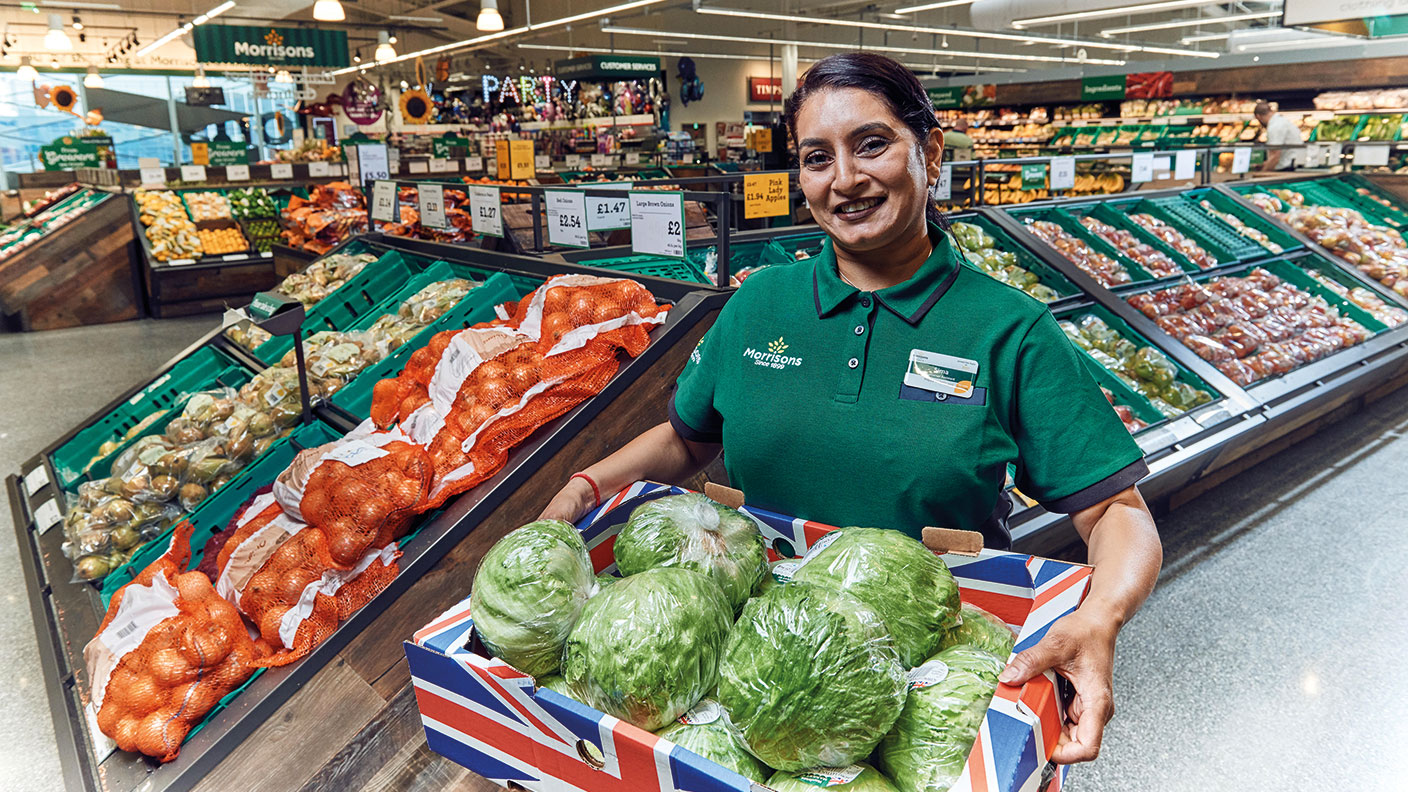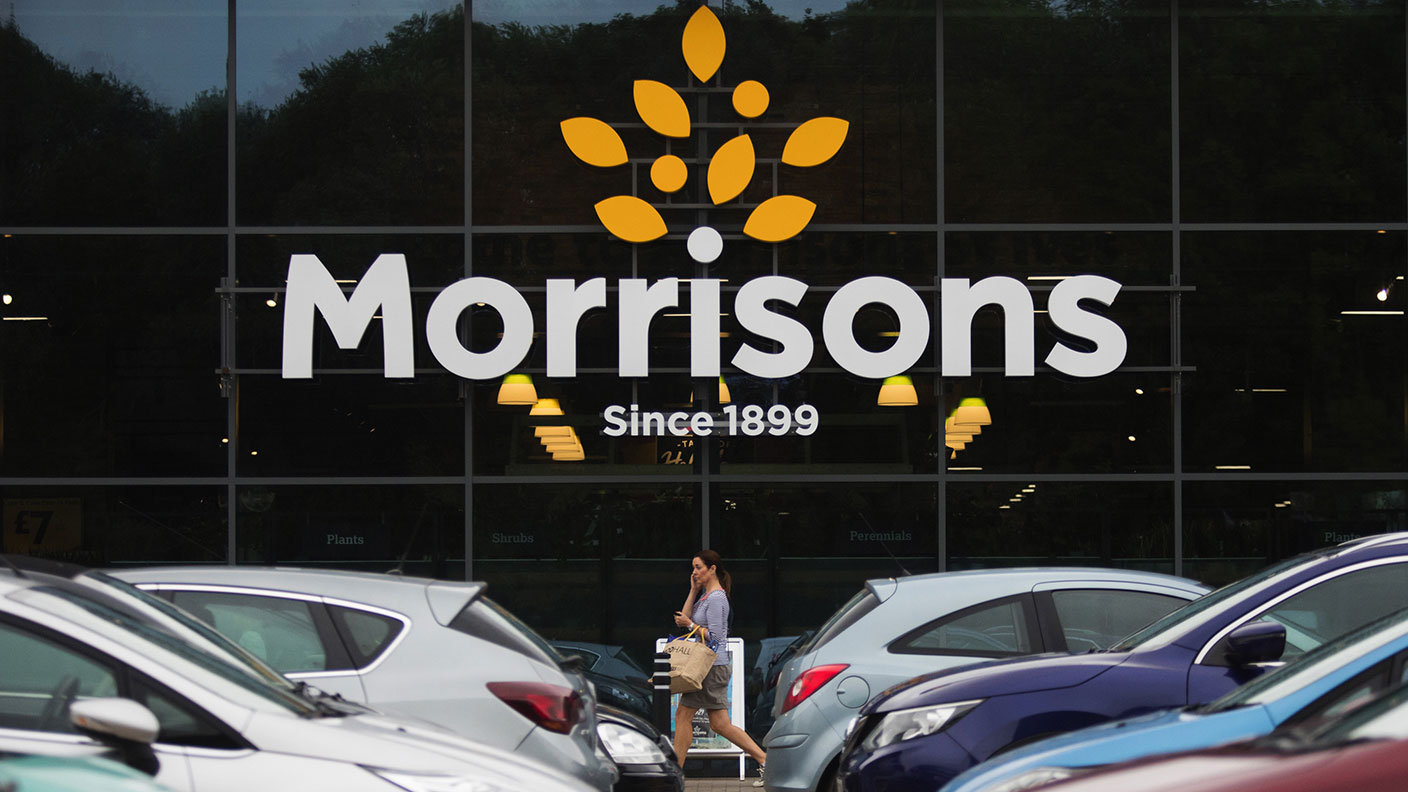Morrisons back from the brink
The supermarket chain has made a strong recovery from a near-death experience. How did CEO David Potts do it? Alice Gråhns reports.
Get the latest financial news, insights and expert analysis from our award-winning MoneyWeek team, to help you understand what really matters when it comes to your finances.
You are now subscribed
Your newsletter sign-up was successful
Want to add more newsletters?

Twice daily
MoneyWeek
Get the latest financial news, insights and expert analysis from our award-winning MoneyWeek team, to help you understand what really matters when it comes to your finances.

Four times a week
Look After My Bills
Sign up to our free money-saving newsletter, filled with the latest news and expert advice to help you find the best tips and deals for managing your bills. Start saving today!

The supermarket chain has made a strong recovery from a near-death experience. How did CEO David Potts do it? Alice Grhns reports.
We're always hearing that chief executives "need silly money because there is an international market for their services",says James Moore on Independent.co.uk. If that's really true, then David Potts, the boss at retailer Morrisons, "should get poached". Many other company bosses who earn far more "won't get close to what he has achieved".
Morrisons, Britain's fourth-biggest supermarket, appeared to be in "terminal decline" not too long ago. Now it has just unveiled a 40% rise in first-half profits, and sales at stores open at least a year "showed a nice improvement".
MoneyWeek
Subscribe to MoneyWeek today and get your first six magazine issues absolutely FREE

Sign up to Money Morning
Don't miss the latest investment and personal finances news, market analysis, plus money-saving tips with our free twice-daily newsletter
Don't miss the latest investment and personal finances news, market analysis, plus money-saving tips with our free twice-daily newsletter
This takes its run of growth to seven consecutive quarters, "an impressive feat given the UK's brutal and unforgiving food market", says Ben Marlow in The Daily Telegraph. So how did Potts, who arrived in 2015, rectify "a series of strategic missteps under misfiring former boss Dalton Philips"? He "kept his head down, and embarked on some old-fashioned, simple retailing". Prices havebeen slashed and thousands of workers hired to bolster customer service.
Reviving the Safeway brand looks an "inspired" decision, as it will allow own-label products to be distributed in more than a thousand convenience stores and newsagents. Potts has also struck deals with Amazon, McColl's and Ocado. The group's stick-to-your-knitting strategy contrasts starkly with rivals' "frantic" takeover sprees in response to the "onslaught" by Aldi and Lidl.
The "fix, build and grow" strategy isn't just paying off in the retailer's bottom line, says Martin Waller in The Times. On other measures, too cash generation, the reduction of debt and the disposal of unwanted properties "Morrisons is ahead".
The twin deals with Ocado and Amazon mean Morrisons exists on the internet as both branded retailer and wholesale supplier, says Lex in the Financial Times. With only 6% of the UK's online grocery market, "Morrisons can afford to experiment". Competitors with larger web footprints are quaking in their boots after Amazon's purchase of Whole Foods Morrisons' tie-up with the US retailer provides "a shield".
Some reckon Amazon could buy Morrisons, but that seems unlikely. As a result, the current valuation of 20 times forward earnings induced by takeover speculation seems lofty. Morrisons would need to "leave its recovery phase far behind to warrant its steep share price."
A cliff-hanger in Toshiba's soap opera
"If insanity is doing the same thing over and over again yet expecting different results, there is something mad in Toshiba's long-running sale of its memory-chip business," says Jacky Wong in The Wall Street Journal. After naming private-equity firm Bain Capital as the preferred bidder for its chip unit in June, Toshiba got embroiled in several legal disputes.
Three months later, it is back with its original suitor. Yet "an actual transaction is hardly closer than it was three months ago". Western Digital, the other half of Toshiba's memory-chip joint venture, still claims it can block any sale by Toshiba that it doesn't like. It has made a competing offer in partnership with private-equity firm KKR.
The reason for this "long-running soap opera", says Quentin Webb on Breakingviews, is that "the business is a hot property", but too big for a single buyer to digest on its own. Lots of vested interests are therefore "jockeying for supporting roles". Toshiba has promised to sign a deal by month-end, and after months of drama, reports suggest the mooted price has moved up around a tenth to 2.2trn ($20bn).
Ignore the drama and just keep an eye on the money, says Tim Culpan in Bloomberg Gadfly specifically what Toshiba gets. "At around 2.1trn, the company will have failed (again), but if it can extract a much higher price, then Toshiba's board might finally be seen to be doing its job."
City talk
"James Murdoch will be none too pleased," says Alex Brummer in the Daily Mail. 21st Century Fox is bidding £11.5bn for the 61% of Sky that it does not already own. But Culture and Media Secretary Karen Bradley has overruled regulator Ofcom and is preparing to refer the deal to the Competition & Markets Authority (CMA), citing "media standards".
The CMA is already looking at the deal from another angle the potential impact on competition. There is now a chance that chief executive Murdoch may decide "the hassle of dealing with Britain's political pygmies has become too much and pulls the offer".
Judge Simon Wolfson's mood by his willingness to run share buybacks, says Nils Pratley in The Guardian. The Next chief executive turned them off in March "because there was too much uncertainty in the air". But now he's willing to return to them.
A 1% tickle to his profit forecast for the year has provoked a 13% rise in the share price. "Another reason for investors' enthusiasm may be the fact Wolfson gives them useful information." An analysis showed that its stores would generate £1bn of cash over a decade even if like-for-like sales declined by 6% per year. "Such analyses should be compulsory for mature retailers." Investors deserve to see the maths.
Support services and construction group Interserve says on its website that it wants to "redefine the future for people and places", notes Alistair Osborne in The Times.
It has just done so for investors by halving the share price in a day. New chief executive Debbie White, who arrived a fortnight ago, has issued the group's fourth profit warning since May 2016. Meanwhile, Interserve has redefined the future for White, too: the value of the shares she was recently awarded has also halved, "a point she'll no doubt make to the pay committee".
Get the latest financial news, insights and expert analysis from our award-winning MoneyWeek team, to help you understand what really matters when it comes to your finances.
Alice grew up in Stockholm and studied at the University of the Arts London, where she gained a first-class BA in Journalism. She has written for several publications in Stockholm and London, and joined MoneyWeek in 2017.
Alice is now Consumer Editor at The Sun and covers everything from energy bills to Social Security.
-
 MoneyWeek Talks: The funds to choose in 2026
MoneyWeek Talks: The funds to choose in 2026Podcast Fidelity's Tom Stevenson reveals his top three funds for 2026 for your ISA or self-invested personal pension
-
 Three companies with deep economic moats to buy now
Three companies with deep economic moats to buy nowOpinion An economic moat can underpin a company's future returns. Here, Imran Sattar, portfolio manager at Edinburgh Investment Trust, selects three stocks to buy now
-
 Morrisons takeover bid: supermarket is an attractive target for private-equity buyers
Morrisons takeover bid: supermarket is an attractive target for private-equity buyersNews A private-equity group has made an offer for Morrisons, Britain’s fourth-largest supermarket. Other bids are likely to emerge. Matthew Partridge reports.
-
 Morrisons is just the start – get ready for a private equity feeding frenzy
Morrisons is just the start – get ready for a private equity feeding frenzyAnalysis The bid to buy the Morrisons supermarket chain is the latest example of UK listed companies being snapped up by private equity groups. It won’t be the last, says John Stepek – we could well see a feeding frenzy before this is all over.
-
 Amazon chews up the grocery market
Amazon chews up the grocery marketFeatures If you hold supermarket shares, watch out, says Alex Williams. Amazon plans to shake up the grocery sector.
-
 Glimmers of hope for Morrisons
Glimmers of hope for MorrisonsNews Supermarket Morrisons enjoyed better-than-expected sales over Christmas.
-
The ten most-hated shares in the FTSE
Features These are London’s ten most-hated shares, judged by the percentage of stock being shorted.
-
Shares in focus: How our tips have fared this year
Features It's been a tough year for stocks. Phil Oakley looks back over the share tips he made in 2014 to see how they have fared, and what investors should do next.
-
It’s time for an orderly retreat in the supermarket wars
Features The big four supermarkets could spend billions taking on the discounters. But the City should not allow them to, says Matthew Lynn.
-
Shares in focus: Who to back in the supermarket wars
Tutorials Morrisons has declared a price war on its supermarket rivals. Will there be any winners, and who should you back? Phil Oakley investigates.